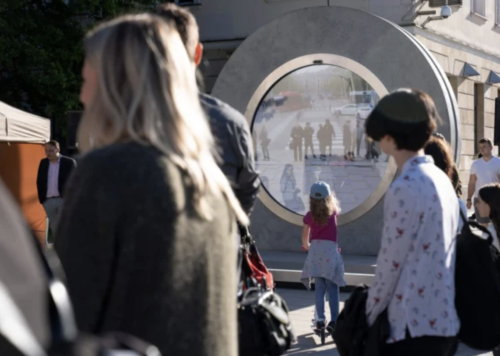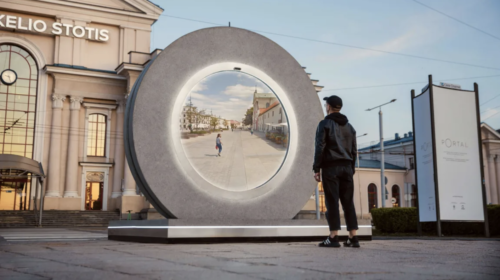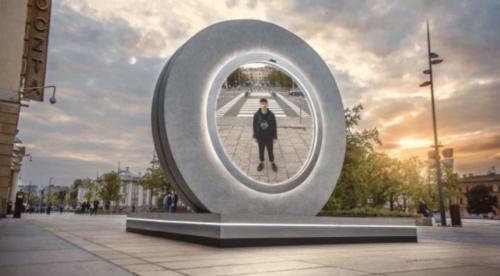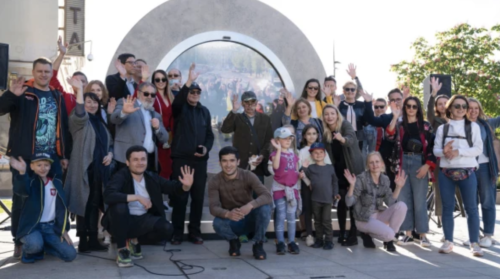This Magical Portal Connects People Across Two Cities
June 19, 2021 by Kathleen Mary Willis
The past 18 months have been isolating. Many of us haven’t seen friends or family. We haven’t traveled. And now, even as much of the United States is opening back up, visiting certain foreign countries is still not an option.
But what if you could visit somewhere without flying? What if you could meet someone face-to-face, without ever leaving your home town?
That’s the idea behind Portal.
It’s a sci-fi inspired sculpture developed by the Benediktas Gylys Foundation, a social innovation group, and Gediminas Technical University.
As you approach the concrete and steel ring, you can see that it is actually a window to another place.
The first Portals are set up connecting the Lithuanian capital Vilnius and the Polish city Lublin.
As people look through the portal in Lublin, people in Vilnius are looking right back.
“Usually people just smile and wave, sometimes they start competitions about what couple could make a more complex shape of a heart with their hands; dancing competitions happen as well,” writes Benediktas Gylys, who created and primarily funded Portal.
“Even the most serious-looking people who look like they have never waved to anyone in their entire lives start smiling and waving with immense joy!”
The project was inspired by Gylys’s own world travels.
He says that in the face of climate change and social injustices worldwide, people fall back on an us-versus-them mentality.
But while experiencing so many cultures around the world, he was reminded that humanity is really all one species.
“If we rose only 30 miles to the sky, all these borders and pointing fingers saying, ‘this is our friend,’ ‘they produce good coffee,’ or ‘this is the enemy’ would make zero sense,” writes Gylys.
“It’s just a tiny spaceship called Earth and it does not have enough capacity for billions of them, but it sure does have enough capacity for billions of us.
We can no longer afford to live on a spaceship in which 99% of it belongs to them.
A shift in our perception is a must if we want to continue our trip.”

What’s particularly striking about Portal is that, technologically speaking, it doesn’t appear to be all that difficult to build.
Fundamentally, it’s not much more than a big screen with a camera for teleconferencing.
But it’s the design that turns this basic technology into a fresh experience.
The monolithic concrete doorway evokes the dreams of sci-fi stories like Stargate and The Wheel of Time, while its screen and camera are able to capture and depict people in their full, 1-to-1 scale.
Yes, you can more easily FaceTime from your pocket, but what’s missing in that experience is that people are miniaturized to live on your screen.
With Portal, they are presented just as they are, and as part of their greater environment.
Because of that scale, and the grounding in the real world, Portal’s screen appears to be an architectural bridge connecting two cities.
(You could call it all a beautiful illusion, but in fact, presenting people in their full size is less of an illusion than shrinking them on our smartphones and laptops!)
But Portal’s success is about more than even physical presentation.
Gylys points out that it is one of the few digital places where you can actually meet new people.
Zoom meetings are preplanned, while the friends you follow on Facebook are either real life acquaintances, or suggested by an algorithm.
“Portal invites you to meet people who, according to [social media] algorithms, are too incompatible with your persona,” says Gylys.
It’s easy to be skeptical of Portal’s message.
The promise of “seeing both sides” can feel pretty played out in today’s dangerous political climate of false equivalency.
My only advice would be, tune out the idea of partisanship and voting for a moment.
Imagine a Portal in your own home town, connecting you to a new city across the globe each day.
The world would feel a lot bigger, and smaller, because of it.
Gylys is planning to build more Portals in the future, including one in Reykjavik, Iceland, and one in London.
And he is inviting anyone who would like to see a Portal in their own city to reach out.





Replies